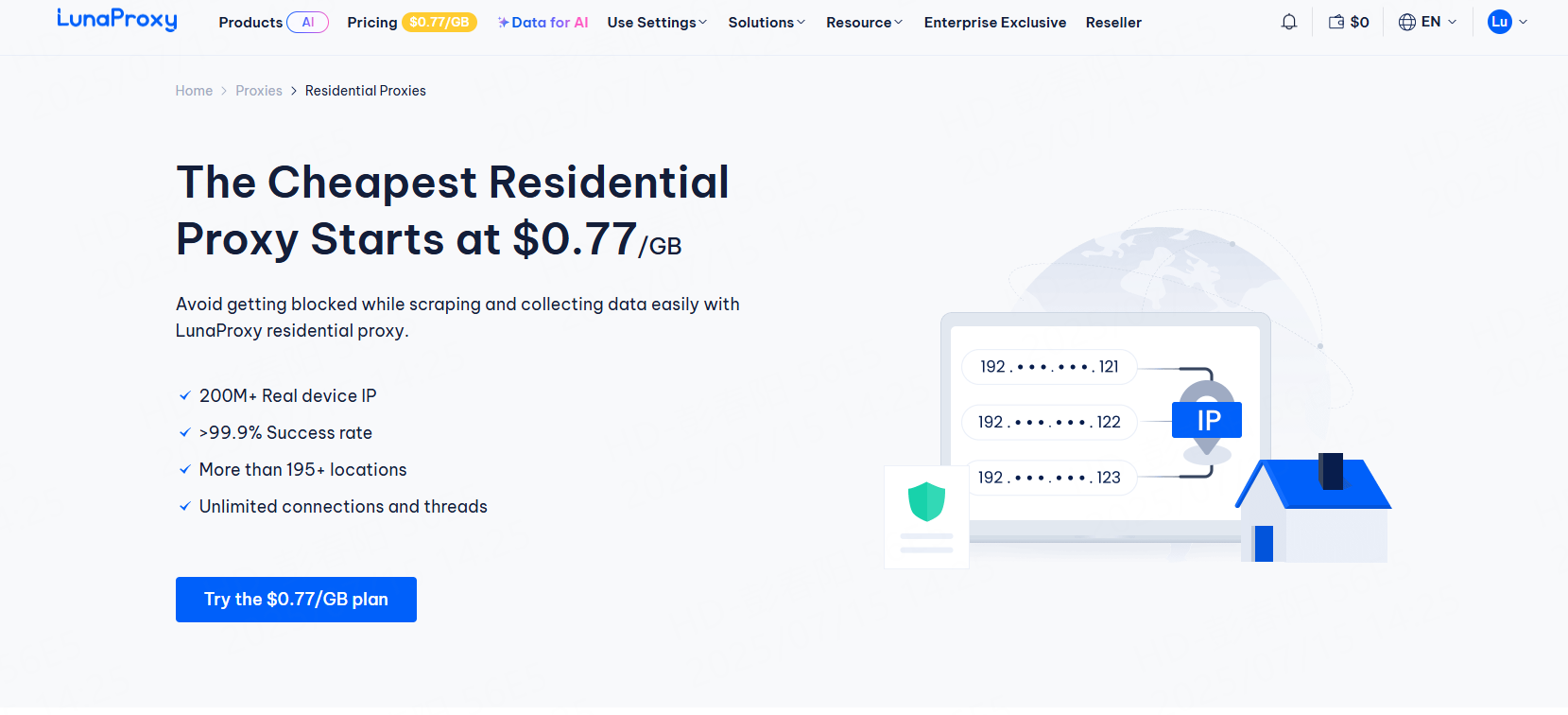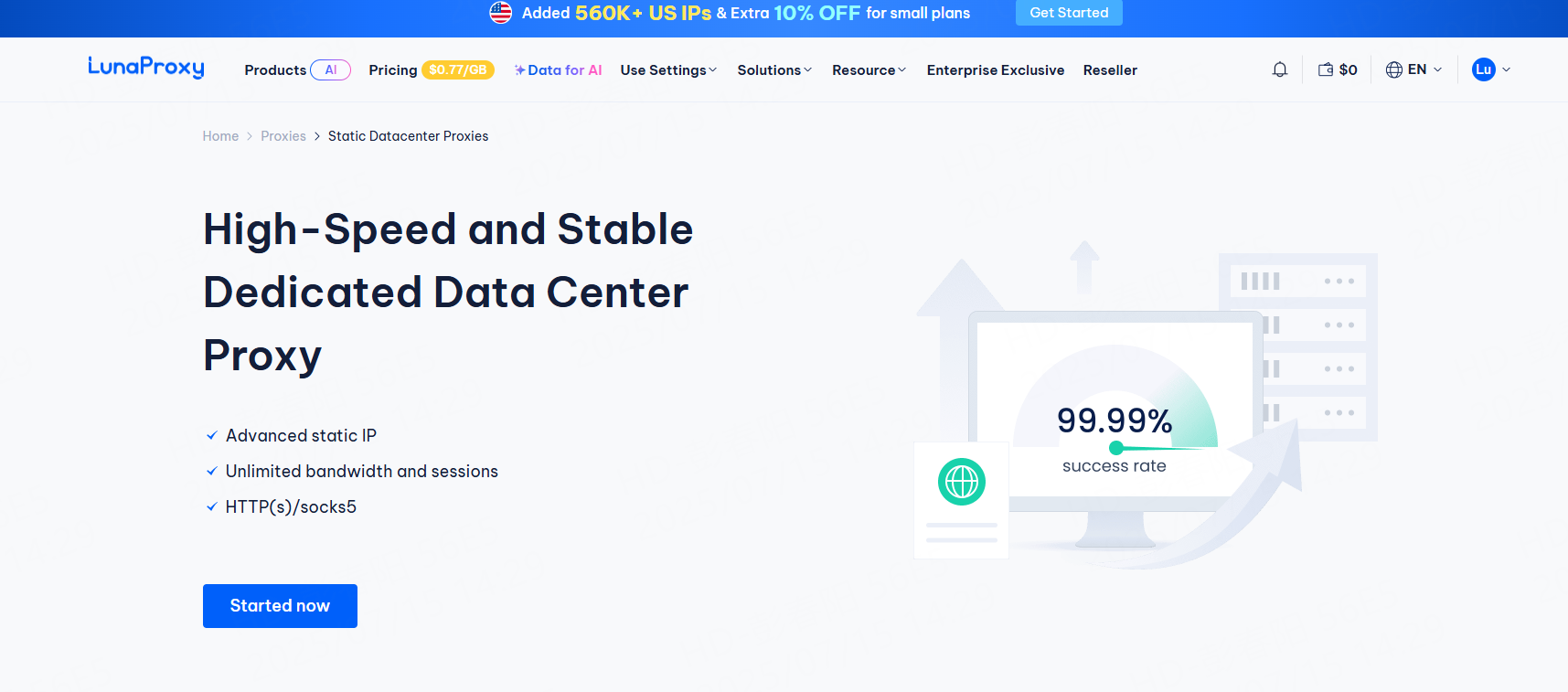
Data center proxies, powered by enterprise-grade bandwidth, deliver high-speed, stable, and cost-effective solutions, making them ideal for high-frequency tasks like large-scale data scraping and price monitoring. Residential proxies, which simulate human behavior through real home IP addresses, offer exceptional stealth capabilities and resistance to blockades, specifically designed for scenarios requiring evasion of strict anti-scraping systems such as social media management and geographical access restrictions.
Understanding the differences between these two types of proxies helps you choose the most suitable solution. In this article, we will explore their pros and cons, as well as how they can benefit your business.
What Are Proxies?
Before diving into the specifics of Datacenter and Residential Proxies, let's first understand what proxies are. A proxy acts as an intermediary between the user and the internet. When you use a proxy, your internet requests are routed through a server (the proxy server), which hides your IP address and makes the request appear as if it's coming from a different location or device. Proxies can be used for web scraping, market research, managing multiple accounts, and many other online activities.
What Are Datacenter Proxies?
Datacenter proxies are created by data centers and are not linked to any specific internet service provider (ISP). These proxies provide high-speed connections and are commonly used for tasks that require large volumes of data. Datacenter proxies come from IPs that are owned by data centers, rather than real residential addresses.
Advantages of Datacenter Proxies
High Speed and Reliability: Datacenter proxies are known for their fast and stable connection speeds. Because they are not associated with residential networks, they can offer superior performance for data scraping, web crawling, and other high-volume activities.
Cost-Effective: Compared to Residential Proxies, Datacenter Proxies are generally more affordable. They are ideal for businesses on a budget that need to handle large amounts of data without a high cost.
No ISP Restrictions: Since they don’t use real residential IPs, Datacenter Proxies are not subject to the same restrictions that residential ISPs may impose, making them useful for tasks that require high-speed access.
Easy to Scale: Datacenter Proxies are easy to deploy and scale up quickly, which makes them a great option for businesses needing large volumes of IP addresses for web scraping or data gathering.
Disadvantages of Datacenter Proxies
Detection Risk: Because Datacenter Proxies are often associated with known data centers, they are more easily detected by websites, especially those using anti-scraping measures. Websites can quickly identify and block these proxies, leading to access issues.
Limited Geo-Targeting: While Datacenter Proxies can offer speed, they often lack the geo-targeting capability that Residential Proxies provide, making them less useful for businesses requiring location-specific data.
What Are Residential Proxies?
Residential Proxies are IPs provided by real residential ISPs. These IPs are tied to physical addresses, meaning they are harder to detect as proxies because they resemble regular user traffic. Residential proxies are more suitable for tasks that require a high level of anonymity and geo-targeting.
Advantages of Residential Proxies
High Anonymity: Since Residential Proxies come from real residential IP addresses, they are harder to detect and block compared to Datacenter Proxies. Websites are less likely to flag or block requests from Residential Proxies.
Better Geo-Targeting: Residential Proxies can provide IP addresses from specific regions or countries, which is especially important for businesses that need to gather data from specific geographic locations.
Bypass Anti-Scraping Measures: Because they use real user IPs, Residential Proxies are ideal for web scraping and other activities that require bypassing anti-bot or anti-scraping technologies. They offer a higher level of success in accessing restricted data or websites.
Ideal for Social Media and E-Commerce: Residential Proxies are commonly used for managing multiple accounts on platforms like social media or e-commerce websites, as they allow businesses to simulate legitimate user behavior without raising suspicion.
Disadvantages of Residential Proxies
Higher Cost: Residential Proxies are typically more expensive than Datacenter Proxies due to the involvement of residential ISPs and the greater level of anonymity they offer.
Lower Speed: Since Residential Proxies are often slower than Datacenter Proxies, they might not be suitable for high-speed tasks like bulk web scraping where large amounts of data need to be collected quickly.
Difference Between Datacenter Proxies and Residential Proxies
When comparing Datacenter Proxies and Residential Proxies, the primary differences lie in speed, cost, and the level of anonymity they provide. Let’s break it down:
| Feature | Datacenter Proxies | Residential Proxies |
|---|
| IP Source | Data centers, not tied to ISPs | Real residential IP addresses |
| Speed | Faster connection speeds | Slower compared to Datacenter Proxies |
| Cost | More affordable | Higher cost due to real ISP involvement |
| Anonymity | Easier to detect and block | Higher anonymity due to real user IPs |
| Geo-Targeting | Limited geo-targeting capabilities | Excellent geo-targeting capabilities |
| Use Case | High-volume data scraping, price scraping | Social media management, location-based data |
Choosing the Right Proxy for Your Business
When deciding between Datacenter Proxies and Residential Proxies, it's important to consider the specific needs of your business. If you are scraping data from websites at a large scale and need high-speed connections, Datacenter Proxies are a more affordable option. However, if your business requires anonymity, geo-targeting, or if you are bypassing advanced anti-scraping measures, Residential Proxies are the better choice.
LunaProxy: A Reliable Proxy Solution for Your Business
At LunaProxy, we offer both Datacenter Proxies and Residential Proxies to cater to your business needs. Whether you need the high-speed performance of Datacenter Proxies or the anonymity and geo-targeting advantages of Residential Proxies, LunaProxy has you covered.
Key Features of LunaProxy’s Residential Proxies:

Global Coverage: Access to real home IP addresses from more than 195 countries/regions to ensure a wide range of geolocation options.
High-Quality Proxies: We provide high performance residential agents to ensure seamless data collection with a success rate of up to 99.9%.
Easy Integration: LunaProxy’s proxies integrate easily with most data scraping tools, helping you automate data collection effortlessly.
High cost performance: LunaProxy's residential agency starts at $0.77/GB, which is the most affordable price while ensuring high anonymity.
24/7 Support: Our expert team is always available to assist with any technical needs, ensuring smooth operations for your business.
Key Features of LunaProxy’s Datacenter proxies:

Exclusive IP resources:The IP address of a specific target site, for personal exclusive use.
Transparent billing: Unlimited bandwidth and unlimited concurrent connections are billed by the number of IP addresses, with no additional charges.
Precise location: Data center proxy IP addresses are distributed all over the world.
High success rate: The agent success rate is up to 99.9%, and the response speed is less than 0.6s.
Conclusion
The choice between Datacenter Proxies and Residential Proxies largely depends on your business’s requirements. If speed and cost are your priorities, Datacenter Proxies may be the better option. However, for businesses needing a high level of anonymity, geo-targeting, and bypassing anti-scraping technologies, Residential Proxies are more suitable.
At LunaProxy, we provide both Datacenter Proxies and Residential Proxies to meet the unique needs of your business, whether you're scraping data, managing multiple accounts, or gathering location-specific insights.








































